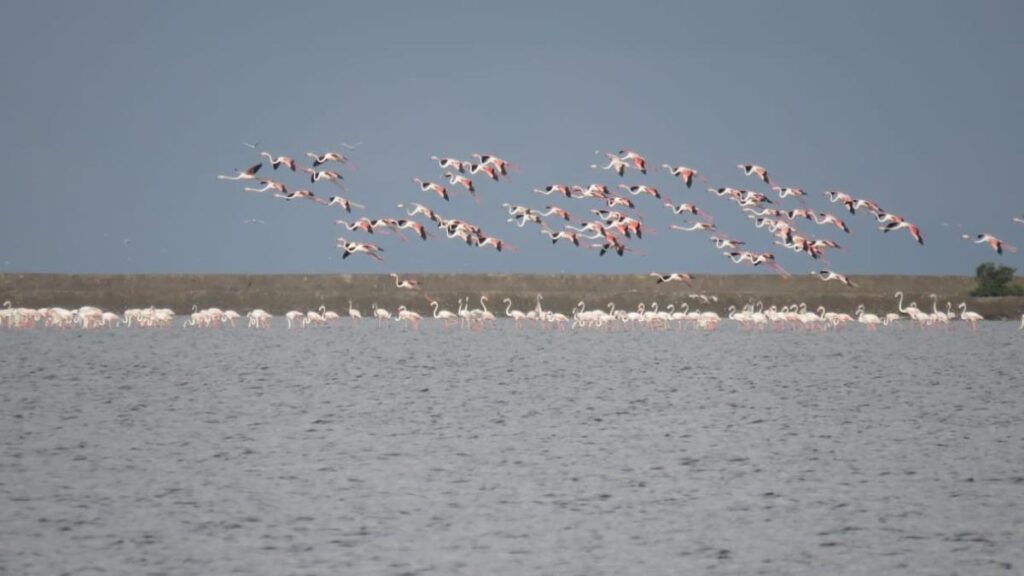
A flamboyance of flamingos at the Point Calimere (Kodiyakarai) wildlife sanctuary in Nagapattinam district. Special Arrangement
| Photo Credit: SPECIAL ARRANGEMENT
Tamil Nadu is among three States taking part in a first-of-its-kind study led by the Indian Council of Medical Research (ICMR) to build a surveillance model for tracking zoonotic diseases in increased bird-human interaction settings, such as sanctuaries.
The study, announced on Friday at the ICMR headquarters in New Delhi, will be carried out at select bird sanctuaries and wetlands across Sikkim, Maharashtra, and Tamil Nadu using the One Health approach to monitor the health of human populations and migratory bird species, and the environment they share, a release from the Ministry of Health and Family Welfare said.
In Tamil Nadu, the study will be conducted at the Point Calimere bird sanctuary in Nagapattinam and Vaduvur bird sanctuary in Tiruvarur. It is expected to begin in May. India is an important stop on the Central Asian migratory bird flyway, making bird sanctuaries potential hotspots for transmission of zoonotic diseases. Workers in these sanctuaries are particularly at risk due to their proximity to wild and migratory birds. This project, involving collaboration between multiple Ministries, including the Ministry of Environment, Forests and Climate Change, the Ministry of Health and Family Welfare, and the Ministry of Agriculture will establish an early warning system for zoonotic spillovers.
The primary objective is to develop a real-time surveillance system to detect zoonotic diseases in bird sanctuary workers and residents living near the sanctuaries. Regular sampling of birds and environmental specimens will be done to identify emerging pathogens using advanced diagnostic tools such as Next Generation Sequencing for early detection of new infections, the Health Ministry has said. Two experts from Tamil Nadu — N. Gopalan, Professor at the Department of Epidemiology and Public Health, Central University of Tamil Nadu, Tiruvarur; and J. Pandiyan, an Associate Professor at the Department of Zoology and Wildlife Biology, AVC College, Mayiladuthurai — presented the implementation plan for Tamil Nadu at ICMR on Friday.
Mr. Pandiyan said that blood and sputum samples would be collected from humans and ectoparasites, cloacal swabs, tracheal swabs and, if necessary, blood droplets, from birds. “These samples will be tested for viruses and bacteria. If any samples test positive, molecular screening will be done to identify the specific pathogens,” he added.
“What makes this study unique is that migratory birds will also be screened — which will provide insights into the movement patterns of zoonotic diseases. Wild birds are often considered reservoirs, sentinels, and spreaders of pathogens. Through this study, we will gain a deeper understanding of interactions between birds, their environment and nearby human populations,” he added. According to the Union Health Ministry, workers in bird sanctuaries and residents in the surrounding areas would be the primary participants, and individuals would be approached for written consent before they are included in the seroprevalence study. Only those giving the consent will be considered.
Soumya Swaminathan, chairperson of MS Swaminathan Research Foundation, said the study was a good start. “What we really need to understand is which viruses are circulating among birds and animals, as many of them have the potential to jump to humans. For example, the H5N1 strain is currently spreading among cattle farms in the U.S. So, this is one we must keep an eye on,” she said.
She stressed the importance of monitoring zoonotic infections owing to the health risks they pose and the economic damage they can cause. “This kind of long-term monitoring study across species is important,” she said.
Published – April 06, 2025 12:30 am IST

